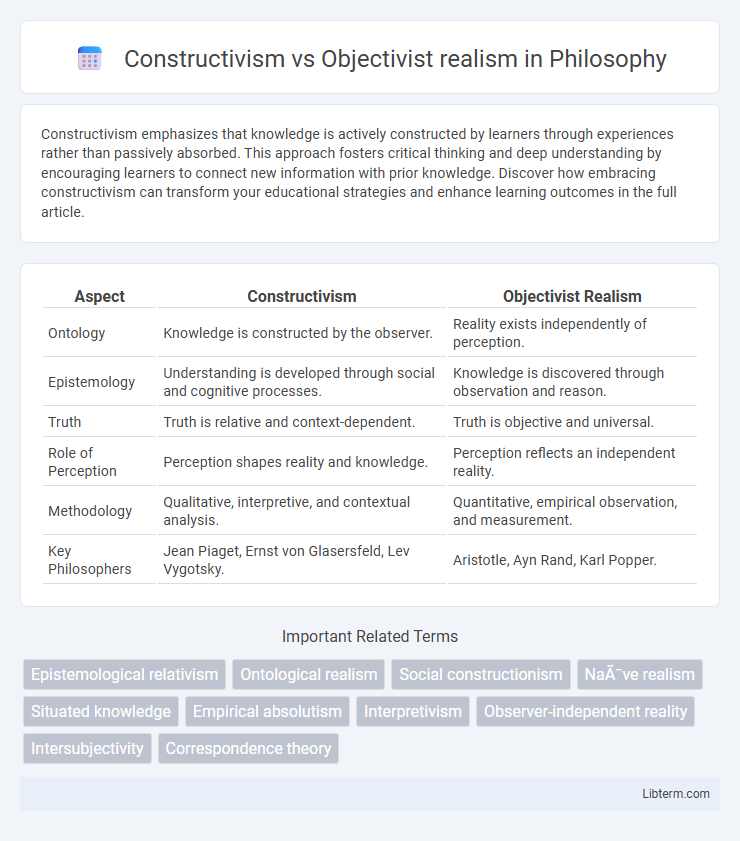Constructivism emphasizes that knowledge is actively constructed by learners through experiences rather than passively absorbed. This approach fosters critical thinking and deep understanding by encouraging learners to connect new information with prior knowledge. Discover how embracing constructivism can transform your educational strategies and enhance learning outcomes in the full article.
Table of Comparison
| Aspect | Constructivism | Objectivist Realism |
|---|---|---|
| Ontology | Knowledge is constructed by the observer. | Reality exists independently of perception. |
| Epistemology | Understanding is developed through social and cognitive processes. | Knowledge is discovered through observation and reason. |
| Truth | Truth is relative and context-dependent. | Truth is objective and universal. |
| Role of Perception | Perception shapes reality and knowledge. | Perception reflects an independent reality. |
| Methodology | Qualitative, interpretive, and contextual analysis. | Quantitative, empirical observation, and measurement. |
| Key Philosophers | Jean Piaget, Ernst von Glasersfeld, Lev Vygotsky. | Aristotle, Ayn Rand, Karl Popper. |
Introduction to Constructivism and Objectivist Realism
Constructivism asserts knowledge is actively constructed by individuals through their experiences and social interactions, emphasizing subjective interpretation and contextual understanding. Objectivist realism posits an independent reality existing outside human perception, where knowledge is discovered through objective observation and empirical evidence. These paradigms contrast in their views on the nature of reality and how knowledge is acquired, influencing research approaches and methodologies across disciplines.
Historical Background of Both Philosophies
Constructivism emerged in the early 20th century, influenced by thinkers like Jean Piaget and Lev Vygotsky, emphasizing knowledge as actively constructed by individuals through experience and social interaction. Objectivist realism, rooted in classical philosophy and revitalized by the 20th-century philosopher Ayn Rand, asserts an independent reality existing objectively, accessible through reason and empirical observation. The historical divergence between these philosophies reflects contrasting views on the nature of knowledge and reality, shaping educational theories and epistemological debates across disciplines.
Core Principles of Constructivism
Constructivism centers on the idea that knowledge is actively constructed by individuals through social interactions and experiences rather than passively received, emphasizing the subjective interpretation of reality. It contrasts with Objectivist realism, which asserts that an independent reality exists objectively, and knowledge is a discovery of that reality through observation and reason. Core principles of Constructivism include the belief that learners create their own understanding, knowledge is context-dependent, and learning is a process of meaning-making influenced by cultural and social factors.
Key Tenets of Objectivist Realism
Objectivist realism asserts that an objective reality exists independently of human perception, emphasizing that facts and truths are discoverable through observation and reason. It holds that knowledge corresponds directly to reality, rejecting relativism and subjective interpretations. This philosophy prioritizes empirical evidence and logical analysis as the foundations for understanding the world.
Differences in Epistemological Approaches
Constructivism emphasizes knowledge as a subjective construct shaped by social interactions and personal experiences, highlighting the active role of the knower in understanding reality. Objectivist realism asserts that knowledge reflects an objective reality existing independently of individual perceptions, prioritizing unbiased observation and empirical verification. These epistemological approaches diverge on the nature of truth, with constructivism advocating for multiple, context-dependent truths, while objectivist realism upholds a single, discoverable truth.
Impact on Educational Theory and Practice
Constructivism emphasizes learner-centered education, where knowledge is actively constructed through experience and social interaction, fostering critical thinking and problem-solving skills. In contrast, Objectivist realism supports a teacher-centered approach that views knowledge as objective and transferable, focusing on mastery of facts and direct instruction. The impact on educational practice involves constructivist methods encouraging collaboration and inquiry-based learning, while objectivist realism emphasizes standardized testing and memorization.
Influence on Scientific Research and Methodology
Constructivism emphasizes the role of social context and human perception in shaping scientific knowledge, advocating for qualitative methods and iterative hypothesis development. Objectivist realism asserts that scientific research discovers objective truths independent of human interpretation, favoring quantitative analysis and experimental replication to verify hypotheses. The influence of these epistemological positions shapes research methodology, with constructivism promoting reflexivity and contextual analysis, while objectivist realism prioritizes empirical measurement and reproducibility.
Debates and Criticisms of Both Approaches
Debates between Constructivism and Objectivist realism center on the nature of knowledge and reality, with Constructivists arguing that knowledge is socially constructed and context-dependent, while Objectivist realists maintain that reality exists independently of human perception and can be objectively known. Critics of Constructivism claim it leads to relativism and undermines scientific objectivity, whereas Objectivist realism faces criticism for ignoring the role of human cognition and social factors in shaping understanding. These debates highlight tensions over epistemology, with Constructivism emphasizing subjective interpretation and Objectivist realism focusing on empirical verification.
Real-World Applications and Case Studies
Constructivism emphasizes the subjective interpretation of knowledge, influencing educational practices like project-based learning and collaborative problem-solving seen in classrooms worldwide. Objectivist realism asserts the existence of an independent reality, underlining fields such as scientific research and engineering where objective measurement and empirical data drive innovation. Case studies in environmental science reveal how constructivist approaches enhance stakeholder engagement, while objectivist realism ensures the accuracy and consistency of climate models.
Conclusion: Bridging Constructivism and Objectivist Realism
Bridging Constructivism and Objectivist Realism involves recognizing the value of subjective human experiences while maintaining the existence of an objective reality independent of perception. Integrating constructivist emphasis on social contexts with objectivist realist commitment to empirical evidence fosters a comprehensive understanding of knowledge formation and truth. This synthesis supports a balanced epistemology that respects both interpretive frameworks and measurable phenomena.
Constructivism Infographic

 libterm.com
libterm.com